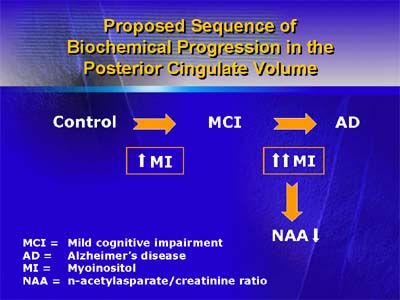Patients with mild cognitive impairment tend to progress to Alzheimer's disease at a rate of 12% per year, compared with about 1-2% of age-matched patients without mild cognitive impairment. Although longitudinal neuropsychological monitoring has proved useful, longitudinal neuro-imaging may allow earlier diagnosis and more powerful prediction of disease progression. Earlier diagnosis may in turn permit improved selection of subjects for clinical care and prevention trials.
Dr. Petersen discussed studies in which patients with mild cognitive impairment were assessed using structural imaging techniques, including quantitative resonance scanning. Those studies have found that patients with mild cognitive impairment have a degree of hippocampal atrophy greater than that of normal persons and less than that of persons with very mild Alzheimer's disease. Moreover, those studies suggest that hippocampal volume may be a sensitive marker for Alzheimer's disease and a potential predictor of disease progression. An association has been reported between the survival curve of patients with Alzheimer's disease and severity of hippocampal atrophy.
Using magnetic resonance spectroscopy to study brain regional metabolism in patients with mild cognitive impairment and patients with Alzheimer's disease, Dr. Petersen observed N-acetylasparate/creatinine ratios that were significantly lower in patients with Alzheimer's disease-a finding consistent neuronal loss or dysfunction.

Dr. Pertersen believes that neuro-imaging findings may enhance the value of clinical and neuropsychological assessment of persons with mild cognitive impairment and afford greater sensitivity in distinguishing normal age-related cognitive change from early Alzheimer's disease.